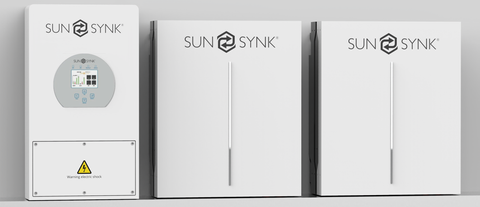What is a hybrid inverter?

A hybrid inverter is a type of inverter that is used in a hybrid solar power system. It combines the functions of a grid-tied inverter and a battery inverter, allowing for both grid-tied and off-grid operation. It can feed excess solar power back to the grid, and also store energy in a battery for later use. This allows for greater energy independence and can potentially reduce electricity costs.
How does a hybrid inverter work?
A hybrid inverter, also known as a hybrid solar inverter, is a device that combines the functions of a grid-tied inverter and a battery inverter. It works by converting the direct current (DC) power produced by solar panels into alternating current (AC) power that can be used in the home or fed back into the grid.
When the solar panels are producing more power than the home is using, the hybrid inverter will feed the excess power back into the grid. When the solar panels are not producing enough power, or when the battery is empty, the hybrid inverter will draw power from the grid to supplement the power from the solar panels.
Additionally, the hybrid inverter can also charge and discharge batteries, so that the excess solar power can be stored for later use. This allows for greater energy independence and can potentially reduce electricity costs.
It also has a built-in management system that regulates the power flow between the grid, solar panel, battery and loads, ensuring that the power is used in the most efficient way possible.
How do I size a hybrid inverter?
Sizing a hybrid inverter involves determining the right inverter capacity that will meet the energy needs of your home or business. There are several factors to consider when sizing a hybrid inverter, including:
1. Solar panel capacity: The inverter must be able to handle the maximum output of your solar panels. The inverter should have a peak power output (also known as the inverter's maximum power point tracking or MPPT) that is equal to or greater than the total output of your solar panels.
2. Battery capacity: The inverter should be able to handle the maximum charge and discharge rate of your battery. You should also consider the usable capacity of your battery, which is the amount of energy that can be stored and used.
3. Energy consumption: You should determine your average daily energy consumption, including the energy required to power appliances and lighting during peak hours. The inverter should have a continuous power output that is equal to or greater than your average daily energy consumption.
4. Future energy needs: Consider whether you plan to add more solar panels or batteries in the future, and ensure that the inverter you choose has the capacity to handle the additional load.
5. Safety: It's also important to consider the safety and compliance of the inverter you choose, ensure that it complies with the relevant safety standards and requirements.
It's important to consult with a professional, such as a licensed electrician or a solar installer, who can help you determine the appropriate inverter size for your specific needs. They will also be able to give you a more accurate calculation of your energy consumption and how much energy you will generate with your solar panels.
Who can install hybrid inverters?
Hybrid inverters should be installed by a qualified and licensed electrician or solar installer. These professionals have the necessary training and experience to install the inverter safely and correctly. They will also be able to ensure that the inverter is compatible with your existing electrical system and that it is connected to the grid in compliance with local regulations and codes.
Installation of a hybrid inverter involves connecting the inverter to the solar panels, batteries, and the electrical grid. It also involves configuring the inverter's settings and programming it to work with your specific battery and solar panel system.
It's important to choose a professional who is licensed and insured, and who has experience with hybrid inverter installations. You can ask for references from previous customers or check online reviews to get a sense of the quality of their work. It's also important to check the warranty, service and maintenance provided by the professional.
It's also important to note that installing a hybrid inverter may require permits and inspections from your local authorities. An experienced professional will be familiar with the permitting process and will be able to ensure that your installation is in compliance with all local regulations.















